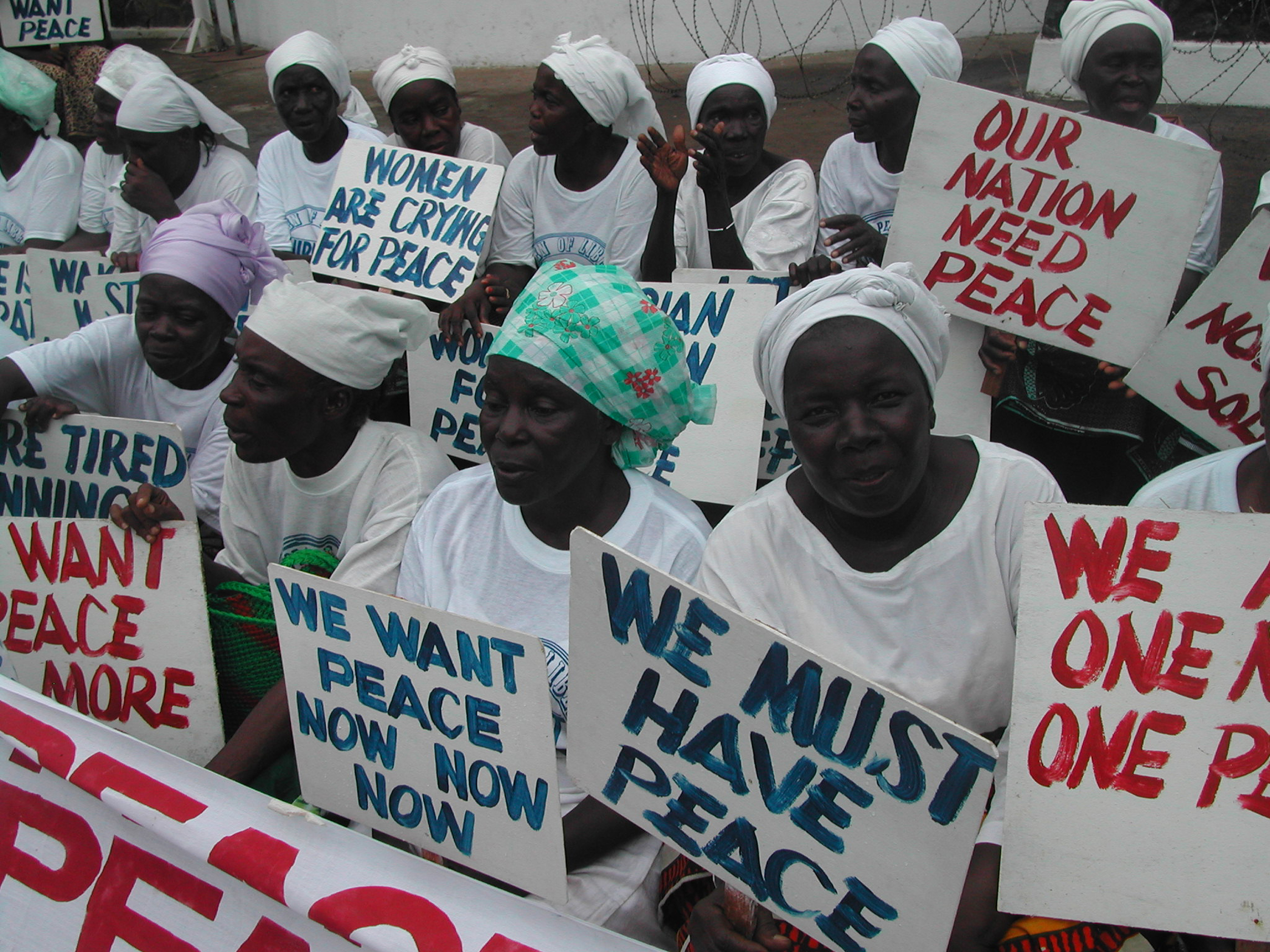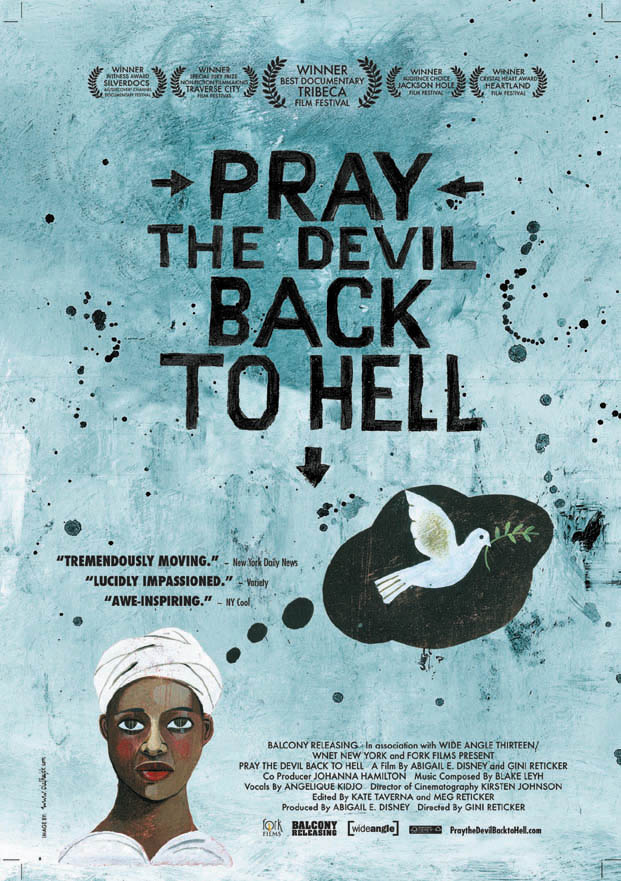The Role of Women in Ending Liberia’s Civil War
Women played a substantial role in ending Liberia’s two civil wars. Thanks to their joint efforts, they brought peace to this war-torn country. 
Table of Contents
Chronology of the two Liberian Civil Wars
The instability of Liberia for the last thirty years is at the heart of the action of women’s groups. It is therefore essential to replace their action into the context.
- 1847: independence of Liberia
- 1980: military coup by Samuel Doe
- 1985: “free” election won by Doe
1989-1996: first Liberian civil war
- 1989: Charles Taylor’s NPFL (National Patriotic Front of Liberia) starts an uprising against Doe
- 1990: Ecowas (Economic Community of West African States) sends a peacekeeping mission.
- 1995: signature of a peace agreement ordering encampment, disarmament and demobilisation of all the fighting groups.
- 1997: presidential and legislative elections, respectively won by Charles Taylor and its NPFL
2000-2003: second Liberian civil war
- 2000: the war starts when a group of rebels, LURD (Liberians United for Reconstruction and Democracy), started taking control of parts of the country.
- 2003: Another rebels group, MODEL (Movement for Democracy in Liberia) joins the civil war.
- During the summer 2003, conflicts gains the capital city, Monrovia.
- June 2003: UN Special Court in Sierra Leone unseals an indictment against Charles Taylor for war crimes.
- August 2003: Nigeria peacekeepers arrive in Monrovia, making Charles Taylor leave.
- October 14, 2003: a new interim government is instituted, with Gyube Bryant at his head.
- September 19, 2003: UN approves Resolution 1509, deploying a UN peacekeeping mission in Liberia.
– 2005, November 23: Ellen Johnson-Sirleaf is elected President of Liberia, being the first African female head of state. (note: she arrived second after Taylor at the 1997 elections)
Source
Timeline: Liberia – A Chronology of Key Events, by BBC News
The Particular Situation of Women in Liberia
The situation of women in Liberia is weak, due to the importance of customary law in society but particularly due to the civil wars that destroyed the country’s stability. The weight of tradition remains strong and married women have Family Code and within the society as a whole. However, Liberian women have a particular situation as they are more educated than their counterparts in other African countries (for instance, the Literacy is one of the highest in Africa). As a result, women are very active on the political scene, the best example of this being the election of Ellen Johnson-Sirleaf as President of Liberia in 2005, the first woman in Africa being elected as a head of State. Also, a Ministry of Gender and Development of Gender Equality in Liberia exists since 2001. For more information about gender in Liberia you can visit the Wikigender page on Liberia . Furthermore, women are very active through civil society, and at all of its levels, from rural farmers to urban elites. Thus, women’s movements actively brought the two Liberian civil wars to an end.
Women’s Initiatives during the two Liberian Civil Wars
Although their role was more substantial during the second Liberian civil war, women’s movements participated in the resolution of the first civil war. Throughout the two conflicts, their action consisted in many demonstrations against the different fighting groups. The strength of Liberian women’s movement lays in their peacefulness and the refusal to use violence, contrary to all of the other actors of the civil conflict.
Focus on: AFELL
One of the most active women’s movement in Liberia was founded during the first Liberian war, but it remained active during the two conflicts and since then. AFELL (Association of Female Liberian Lawyers) is a group of female lawyers based in the capital city Monrovia, representing women in the entire country. In particular, they focus on cases of rape , as it is a common practice among soldiers during war time. With the Center for Abused Girls and Women, they documented the experiences of Liberian women during the war years. Their role was thus important to help women to break the taboo existing around this question, and then to represent them in court against their rapist. A major success of the association happened in 2000, when AFELL was granted the right to prosecute rape cases, whereas before this date, only state lawyers were allowed to prosecute criminal cases. AFELL was later able to influence the legislation in drafting a new legislative bill increasing the penalty linked to rape. AFELL’s work is very close to women, notably through its legal aid clinic in Monrovia. There, lawyers give daily advices to women victims of rape or gender violence. However, AFELL does not limit its fight to rape and war crimes, as it is also fighting on the field of inheritance rights and customary law.Drea Knufken, “From Learning to Legislation – AFELL Empowers Liberia’s Women” on Women News Network
Focus on: MARWOPNET
AFELL was not the only women’s group acting during the Liberial civil war. Another major women’s group is MARWOPNET (Mano River Women’s Peace Network), that launched a program of shuttle democracy between the capitals of the three Manor River countries, Liberia, Sierra Leone and Guinea . Liberia’s neighbouring countries played an important role during the conflict: for instance, many fighters took refuge in Guinea and Sierra Leone during the first conflict. The importance of the region was even stronger during the second conflict, when Liberia was engaged in a regional conflict with Guinea and Sierra Leone that supported the rebels of LURD. Facing this regional conflict and the impact on women, Mano River’s women got together to solve the conflict in these three countries. Eventually, they succeeded in this task by having the three respective leaders of Liberia, Sierra Leone and Guinea to meet in Rabat in 2002. On this subject an anecdote is reported by African Renewal Michael Fleshman “African women struggle for a seat at the peace table” in Africa Renewal, Vol.16 #4 (February 2003), page 1: when the MARWOPNET delegation went to Guinea to convince President Conté to come and sit at a table next to Charles Taylor, the President answered to their offer: “What man do you think would say that to me? Only a woman could do such a thing and get by with it.” He finally accepted to participate to the summit admitting: “Many people have tried to convince me to meet with President Taylor. Your commitment and your appeal have convinced me.” For its achievements, MARWOPNET received the United Nations Prize in the Field of Human Rights in 2003.
Focus on: Women in Peacebuilding Network (WIPNET)
WIPNET is a women association present in several countries of West Africa (Liberia, Sierra Leone, Nigeria ), created from the broader West Africa Network for Peacebuilding (WANEP). WANEP was created in 1998, facing the need for civil action to counter the civil conflicts raging in West Africa. WIPNET was then created to ensure that women would not be submitted again to a patriarchal society following the end of the war. Women had a substantial role to play in the peacebuilding process, but they also had a role to play in the society as a whole. WIPNET’s women started acting from the beginning of the First Liberian Civil War, organizing marches for peace and security from 1991 and attending the peace conference from 1993. The peak of their action happened during the second Liberian civil war, when WIPNET’s women met Charles Taylor and after long talks, convinced him to meet with the rebel forces. Strong of the numerous contacts they had in the neighbouring countries, they were able to organize a trip to Sierra Leone, meet the rebel leaders and convince them to participate in the meeting with Taylor. Thus, it was the women’s actions that allowed the Accra summit – the peace summit – to happen. However, they were not invited to the peace talk and therefore they organized more demonstrations, but this time in Accra, Ghana , and joined by Ghanaian, Sierra Leonean and Nigerian women.John Paul Lederach and Angela Jill Lederach, “Women of Liberia’s mass action for peace” in The Scavenger retrieved on February 28, 2011 When the 2003 peace agreement was signed, the actions of WIPNET went from resolving the conflict to building peace. An interesting example of the strength of these women can be found during this period: whereas the women were excluded from the disarmament process, they went themselves to the fighters camps to convince them to abandon their weapons. Finally, during the 2005 election campaign, women of WIPNET launched a campaign of registration, noting that many women were not registered to vote.Women’s Role in Liberia Reconstruction , USIP briefing by Dorina Bekoe and Christina Parajon. WIPNET’s women different actions were featured in a 2008 documentary Pray the devil back to hell. This film focuses on the actions that took place during the Women of Liberia Mass Action for Peace Campaign. In particular, it follows the leaderships of Leymah Gbowee and Asatu Ben Kenneth. These two women were respectively members of Christian and Muslim associations and they decided to join their efforts towards peace. They organized sit-in, mass demonstrations and even a sex strike to protest against the war and make men react.
WIPNET’s women different actions were featured in a 2008 documentary Pray the devil back to hell. This film focuses on the actions that took place during the Women of Liberia Mass Action for Peace Campaign. In particular, it follows the leaderships of Leymah Gbowee and Asatu Ben Kenneth. These two women were respectively members of Christian and Muslim associations and they decided to join their efforts towards peace. They organized sit-in, mass demonstrations and even a sex strike to protest against the war and make men react.
Women in Liberia after the war
One of the most significant illustrations of the empowerment of women following the end of the Liberian civil war is the election of Ellen Johnson-Sirleaf as President of Liberia. She took care of giving an important place to women in her government, women being at the head of the ministries of commerce, justice, finance, youth and sports and gender and development.
See also
References
Sources and External links
- Mary H. Moran and M. Anne Pitcher, “The ‘Basket Case’ and the ‘Poster Child’: Explaining the End of Civil Conflicts in Liberia and Mozambique” in Third World Quaterly, Vol. 25, No. 3 (2004), pp. 501-519 (accessed: 21/02/2011 on jstor.org)


